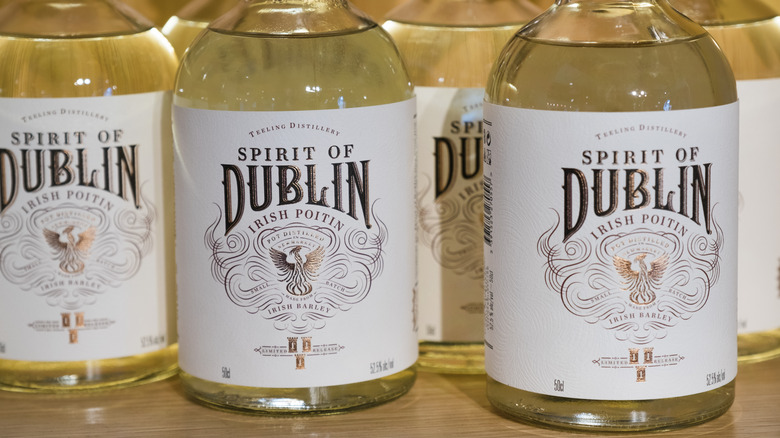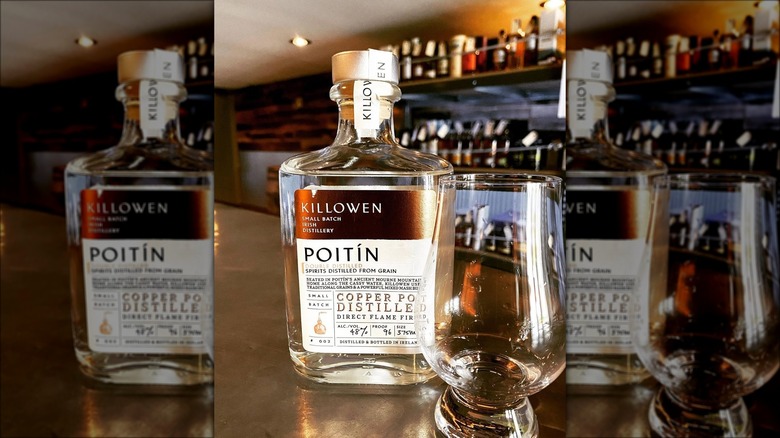Poitin Is The Irish Moonshine Drink That Dates Back To The 6th Century
Ask a sampling of people to name Ireland's national drink, and it's a pretty good bet that you'll get one answer over and over again: Guinness. While it's true that the dark stout so indelibly linked to the Emerald Isle holds a place of honor in Irish tradition — the Guinness Storehouse is Dublin's top attraction — another lesser-known libation could probably give the black nectar a run for its money. That is, if anyone knew about it. We're talking about poitin (pronounced puh-cheen). Not to be confused with poutine, Canada's unofficial national dish consisting of french fries, cheese curds, and gravy, poitin is Irish moonshine. And, until the late 1990s, it was outlawed in Ireland.
These days, the high-octane spirit (ABV ranges from 60% to 90%) is enjoying a renaissance of sorts as Ireland's craft distillers put their own stamp on the drink their ancestors made from malted barley or potatoes. However, the same alcoholic beverage was forced into underground production when the British Crown instituted a tax on distilled spirits way back in 1661. It may have been gone from sight for more than three centuries, but poitin was never forgotten.
Lurking in the shadows
Like so many ancestral libations (Chartreuse in France, Ouzo in Greece, and Aromas de Montserrat in Spain), Ireland's poitin has monastic roots. Created by 6th-century Irish monks, it evolved over centuries to become a staple across the Irish countryside, where it reigned for a thousand years as the traditional drink to mark noteworthy occasions from wakes to weddings. In 1661 Britain tried to cash in on its popularity with a tax. Not to be deterred, Irish distillers took measures to conceal production, thwarting tax collectors' efforts to collect the levy. When the tax didn't generate the income the British Crown expected, King Charles II took the battle to the next level, declaring the production of poitin illegal. Once again, the beloved tipple was out of sight but definitely not gone. By some accounts, its illegal status added to poitin's allure, making it a symbol of defiance and Irish disdain for British rule.
Distillers just went deeper underground, creating a clandestine distribution network and relying on a well-timed wink or a nod to signal availability. There was an air of irreverence as wily distillers intentionally set up production directly on property boundaries to create confusion about ownership in the event of a raid by authorities. In the meantime, those same distillers continued perfecting their technique, tweaking production, and passing their skills from one generation to the next. Through the years, poitin morphed from a rough-and-tumble tipple to a refined spirit, but it was still illegal until 1997.
A new day dawns
Sometime in the mid-20th century, distillers began to chafe against Britain's restrictions. The British government made a minor concession in 1987 when it allowed limited production of poitin, but only for export. It took another decade before the regulation was completely sacked, paving the way for a new age of craft distillers — a new generation of artisanal producers who brought generations of expertise to the table, showcasing the history and tradition of poitin while experimenting with new techniques and finessing the beloved spirit. Finally, in 2008, poitin earned GI (geographic indicator) status, a protected category that guards the authenticity of European products.
The 21st-century result is a more refined drink on par with good Irish whiskey. In fact, some poitin connoisseurs recommend replacing Irish whiskey with poitin in Irish Coffee. It also brings an interesting twist to cocktails that are usually made with whiskey, vodka, or rum. Try it in a poitin sour or an Irish Mule. Served neat or on the rocks, poitin provides a balanced nuance to rich and hearty foods; come to think of it, that may mean poitin is the perfect foil for Canadian poutine.


